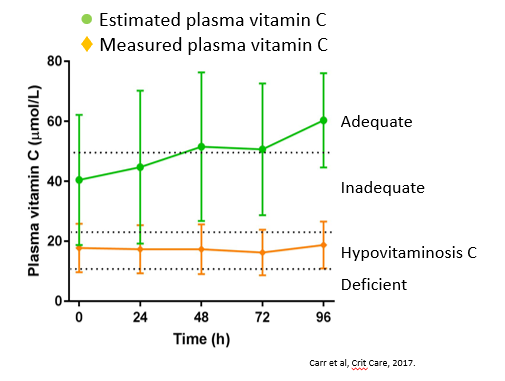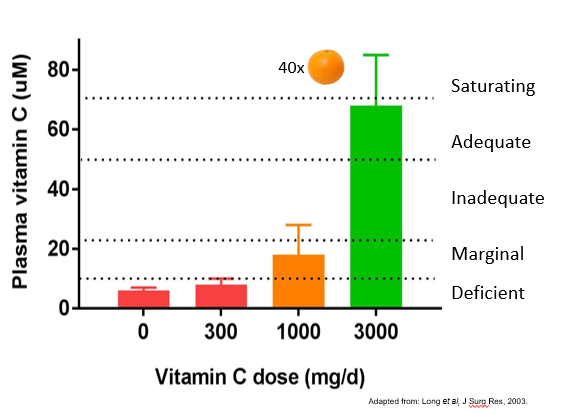Recently I asked the highly renowned vitamin C expert research professor Anitra Carr about the importance of suppletion of vitamin C in the acute phase of sepsis and beyond
(she gave her permission to share her words in this blog)
About professor Anitra Carr:
Professor Anitra Carr is Principle Investigator and Head of the Nutrition in Medicine Research Group in the Department of Pathology and Biomedical Science at the University of Otago, Christchurch (UOC), New Zealand. She authored a series of highly regarded publications on the role of vitamin C in human health and disease, which helped to develop international recommendations for dietary vitamin C intake. Among her publications was the article “Hypovitaminosis C and vitamin C deficiency in critically ill patients despite recommended enteral and parenteral intakes” published in Critical Care in 2017.
Anitra Carr is recognized as a world-leading scientist and was awarded a gold medal by the UOC.
👉She will give a presentation at the Round Table session on the 18th of June. You are most welcome to follow it online. For information and to receive the link: https://www.cmsm.nl/en/
Explanation by Anitra Carr:
“The primary rationale for administering vitC to ICU patients (particularly those with sepsis) is that they have a much higher turnover of the vitamin (see figure below of difference between estimated and actual vitamin C status based on amount of vitC administrated).
As such, they need higher doses (~10-fold higher) administered to reach optimal plasma status (see figure below). In contrast 300 mg/d vitC would be more than sufficient for a healthy person to reach optimal/saturating status.
Also, stopping vitC administration too early results in a proportion of ICU/septic patients dropping back down to hypovitaminosis C values. As such, it should really continue to be administered until discharge (and then ideally oral vitC taken post discharge).
The rationale for keeping vitC values at optimal/saturating levels is that the enzymes in the body that rely on vitC for functioning require specific concentrations of the vitamin for optimal activity.
Also, I feel the vitamin may be more effective in people with respiratory sources of sepsis (ARDS), rather than ICU patients in general. Pneumonia is one of the primary complications of vitC deficiency suggesting a strong link between vitC and severe respiratory infections.
Vitamin C deficiency is potentially fatal ie if a person stays too low for too long they could potentially die.”
Ned. vertaling:
“De belangrijkste reden voor het toedienen van vitamine C aan IC-patiënten (met name patiënten met sepsis) is dat ze een veel hogere omzetting van de vitamine hebben (zie onderstaande figuur over het verschil tussen de geschatte en werkelijke vitamine C-status op basis van de toegediende hoeveelheid vitamine C).
Daarom hebben ze hogere doses nodig (ongeveer 10 keer hoger) om een optimale plasmastatus te bereiken (zie onderstaande figuur). Daarentegen zou 300 mg vitamine C/dag meer dan voldoende zijn voor een gezond persoon om een optimale/verzadigende status te bereiken.
Het te vroeg stoppen van de toediening van vitamine C leidt er bovendien toe dat een deel van de IC-/septische patiënten terugvalt naar hypovitaminose C-waarden. Daarom zou het eigenlijk tot ontslag moeten worden toegediend (en idealiter daarna oraal vitamine C).
De reden voor het op een optimaal/verzadigend niveau houden van de vitamine C-waarden is dat de enzymen in het lichaam die afhankelijk zijn van vitamine C voor hun functioneren, specifieke concentraties van de vitamine nodig hebben voor een optimale werking.
Ik denk ook dat de vitamine effectiever kan zijn bij mensen met respiratoire sepsis (ARDS), dan bij IC-patiënten in het algemeen. Longontsteking is een van de belangrijkste complicaties van vitamine C-tekort, wat suggereert dat er een sterk verband is tussen vitamine C en ernstige luchtweginfecties.
Vitamine C-tekort is potentieel dodelijk: als iemand te lang een te laag vitamine C-gehalte heeft, kan hij of zij mogelijk overlijden.”
Regarding the use of vitamin C in the treatment of sepsis, this article by Hemilä and Chalker was published: ‘Vitamin C for patients with sepsis?‘ in september 2024.
Hemilä H and Chalker E (2024) Vitamin C for patients with sepsis? Front. Med. 11:1450091. doi: 10.3389/fmed.2024.1450091
June 12th 2025



